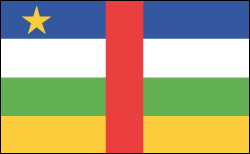2013 World News: Central African Republic

Country Falls into a Civil War after Coup
In March 2013, President François Bozizé was ousted by rebels from the northern part of the country. The rebels, who are mostly Muslim and collectively known as Seleka, have been engaged in battles with government troops and said they overthrew Bozizé because he failed to follow through on earlier peace deals. Bozizé's presidency was marred by allegations of corruption and cronyism—hardly a surprise in one of the world's poorest and most unstable countries. Michel Djotodia, the coup leader, assumed power, suspended the constitution, and dissolved parliament. In mid-April he created a transitional council that named him interim president. He was sworn in as head of state in August and promised to hold free and fair elections within 18 months. The African Union suspended the country in response to the coup, and refused to recognize Djotodia as president. Djotodia was not able to stem the violence in the country, and CAR spiralled into chaos. Seleka rebels terrorized civilians, and Christian opponents formed their own militias to retaliate and defend themselves. About 400,000 people, in a country of 4.6 million, fled their homes. In October, UN Secretary-General Ban Ki-moon said the country had experienced "total breakdown of law and order," and he authorized the deployment of a peacekeeping force. In December, the African Union said it would increase the size of its force there from 3,500 troops to 6,000. France deployed 1,600 soldiers to CAR, a former colony of France. Many feared that CAR was on the brink of experiencing a genocide. —Beth Rowen |
- More from 2013 News of the World









